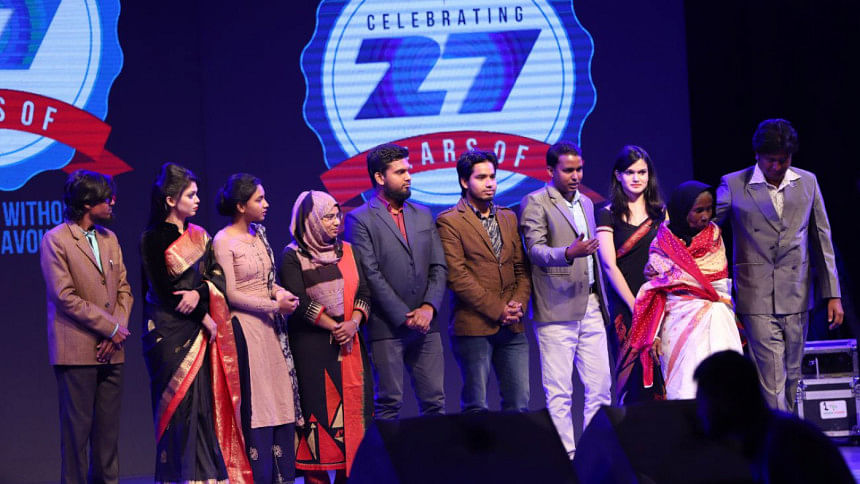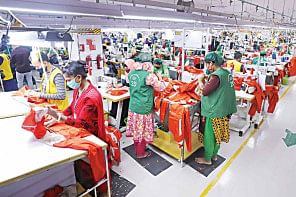Only a free media can ensure prosperity for Bangladesh

I would like to say with the utmost earnestness that a prosperous Bangladesh needs a very vibrant, free media. A thriving Bangladesh needs journalism of the highest standard. It does not need restrictive laws like the proposed Digital Security Act. Instead, a buoyant Bangladesh needs a very competitive private sector, a highly disciplined banking sector and an accountable and transparent administration. For Bangladesh to flourish, it needs a democratically elected government as it has had since the fall of autocracy. For Bangladesh to grow, it needs a dynamic but mutually respectful collaboration between the free media and the government of the day.
We all believe that Bangladesh has a very bright future. We are very committed to working together with the government, with the bureaucracy, with the private sector, with the law enforcement agencies, with civil society bodies—in fact with all the institutions of the country for the future growth of Bangladesh.
But please remember that each of us has our own specific, cut-out role. Just as the government needs to govern with transparency and accountability, just as the MPs of the parliament need to serve their constituencies, just as the police need to ensure the proper enforcement of law and order, just as importantly a free, independent and ethical media needs to play the role of the watchdog that it is. If any of us fails to perform our respective and distinct role, if police fail in their duty to impart law and order properly, if the MPs fail to perform their duties in serving the people, if the government fails to govern under law, and similarly, if the free media fails to fulfil its professional and moral duties, then the country suffers. Since we all love our country, let all institutions and professions perform their respective duties freely, according to their respective ethical norms.
Many of us know, but perhaps do not realise, that only two professions are protected by the constitution which is the highest authoritative legal document by which a country is governed. The constitution is the reference point for good governance, of justice, of rule of law, and of freedom. And in that constitution only two professions are specifically mentioned. They don't talk about the engineers or the doctors or the businessmen or the lawyers. They talk only about the judiciary and the media. Why? Why does the constitution of every democratic country mention these two professions? Because experience has shown, because history has proven, because it is the truth that every country has realised, that when you have an independent judiciary, only then can you impart justice. When you have an independent media, only then are the people as well as the government well-served.
For example, the government makes policies, takes important administrative steps, implements huge, highly expensive projects. How will the government know if that project is being implemented properly? How will the government know if their policies are actually serving the people they wanted to serve in the first place? How will they know what people think of their policies and of the government as a whole? How will they know the alternatives to their own policies if dissenting views are not heard? Will the bureaucracy tell them the facts on the ground? Will the official channels tell the truth? Government after government has fallen in many parts of the world, including ours, because they solely depended on official channels to learn the truth on the ground. Only a free media will tell the government the truth. So a democratic government must always realise that for their own good, for their own success, more than anything else, they need a free media. That is what we have been trying to say and do in The Daily Star for the last 27 years, often if I may add, at the risk of being misunderstood.
Many of you may remember, some of you might have forgotten, that in the past every time a hartal was called, every time, without exception, The Daily Star protested. Every time the opposition boycotted the parliament, The Daily Star protested. Every time the government of the day oppressed the opposition with police and other forces, The Daily Star protested. Why? Because we believed that all such actions harmed democracy, and were detrimental to the interest of our country and its people. We believe that it is only through the institutionalisation of democracy that we can ultimately reach sustainable prosperity.
There is a belief that in a country like Bangladesh, we need development first, democracy later. I would like to suggest very strongly that this idea is fundamentally flawed, intellectually bankrupt and historically false. Nowhere in the world has it been proven to be correct.
Though it has been proven to be wrong, it keeps coming back. We have been told in other times and in many other countries, that democracy can wait and development must come first. "Freedom means nothing in a hungry stomach," we are reminded ad nauseam. For those of you old enough to remember, we heard it in the days of General Ayub Khan during the Pakistan period.
It never worked because democracy and development go hand in hand. There is no first and there is no second. And when they can go hand in hand, only then can development serve the purpose of the people. Because, you can have development only for the rich, the privileged and the powerful. But if development is for the people, then the people must have a voice to say what they think of the development process. And that is only ensured by democracy which is the only system that sustains a free and independent media which, in turn, gives the people the "voice".
Ladies and gentlemen, it has been my singular honour to have led this institution for the last 25 years. Today, we are 27 years old. We began with the illustrious leadership of SM Ali who was the founding editor, along with the exceptional and committed stewardship of our founding chairman Azimur Rahman, founding managing director AS Mahmud, and founding managing editor Taufiq Aziz Khan.
It is my privilege that I have been able to follow their footsteps. It is my good fortune that I have been able to lead a dedicated group of very committed, ethical and patriotic journalists.
It gives me and my team a great sense of satisfaction that we have been able to come to your door every morning for the last 27 years with issues that concern you. When you had garbage stinking at your doorstep, we reported on it. When you suffered in traffic jams, we spoke on your behalf. When our rivers were polluted, we raised hell. When our banks were looted, we shouted at the top of our voice. When corruption ate away the hard-earned gains of our people, we revealed the culprit to the best of our ability. In fact, on every issue of public concern, we tried to stand beside you. Unfortunately, much too often our efforts went unheeded.
Similarly, when democracy, fundamental rights and rule of law were threatened, we protested.
And ladies and gentlemen, I assure you, we are going to continue to protest as best and as hard as we can.
This protest does not come from any antagonism to a government, a party or any group. It comes from our sense of duty as journalists, our role as the "watchdog" and our love for our people. It comes from our patriotism. It comes from the values that we have inculcated during our Liberation War. We believe that Bangladesh must grow in the light of the values that our freedom struggle represents. We believe that Bangladesh must be a society of justice. We believe that Bangladesh must be a country of freedom. And it is from that belief that, ladies and gentlemen, our journalism and this paper will be directed.
I would like to extend my heartiest and deeply felt gratitude to my board of directors because without an enlightened board, without a board committed to the freedom of the press, believe me, I, as an editor, cannot run this newspaper. Also, my grateful thanks to our readers, patrons and advertisers who continue to be beside us. You all may know, or some of you may not know, that for the last two years or so, 40 percent of our advertisements have been cut, not because we failed to serve our readers or the ethics of journalism, but because of reasons unknown to us.
In conclusion I would like to say that The Daily Star is an ethical, professional and a patriotic newspaper. It is fully committed to the future of Bangladesh. And in that commitment, it is our considered view that without a free, independent and professionally competent media, Bangladesh cannot achieve the success that we wish it to and it has the capacity to. The Sonar Bangla we dream of will be a Sonar Bangla of prosperity and of freedom. And in that journey to prosperity and freedom, I invite you all to join The Daily Star.
Thank you very much.
This is an edited version of the speech delivered by Mahfuz Anam, Editor and Publisher of The Daily Star, on the occasion of the paper's 27th founding anniversary celebrations held on February 16, 2018.

 For all latest news, follow The Daily Star's Google News channel.
For all latest news, follow The Daily Star's Google News channel. 



Comments